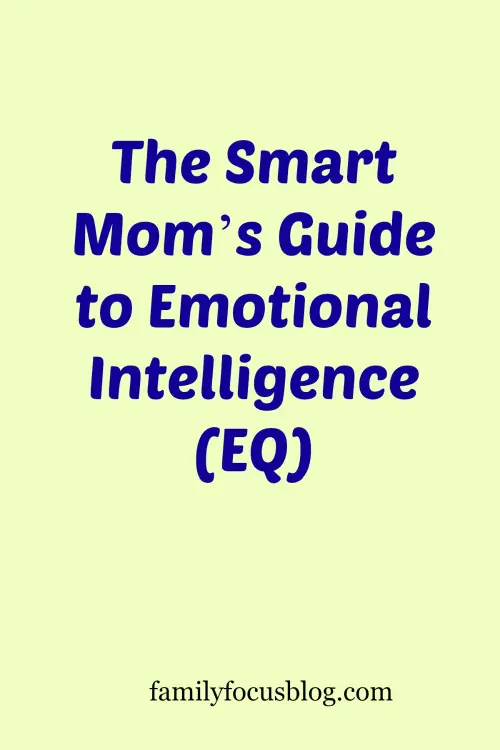My husband is a teacher and they have inspirational speakers come and speak to the faculty every so often. He shared with me that they had a speaker talk about EQ (emotional intelligence). It is helpful in teaching children and helping them be more well rounded, and more well adjusted. He was impressed by the talk and ordered me a book about EQ. It is a very informative topic for parents to consider. I am very pleased to bring you some information on Emotional Intelligence from parenting and child development expert Denise Daniels. She will discuss some key traits exhibited by mothers with a high EQ level. The below gives you a good introduction to the topic of Emotional Intelligence and the benefits of developing EQ. The importance of emotional intelligence directly relates to the ability to be successful in life through better relationships and leadership skills.
The Smart Mom’s Guide to Emotional Intelligence
I want to have a chat about your EQ. Not your IQ (nobody wants to hear those numbers), but your emotional intelligence. That is going to be a lot more important to your children’s well-being and success than your college degree or your vocabulary. Emotional intelligence (EQ) is essential for effective leadership, as it enables leaders to connect with their team on a personal level, fostering trust, understanding, and motivation. As parents, we are naturally in leadership positions and have the chance to improve our parenting by improving our own EQ.
EQ Meaning:
Emotional intelligence (EQ) is the ability to recognize emotions in yourself and others, and to regulate your own emotions. That’s a simple statement, but it’s not a simple thing for either children or adults. Yet for children, it has huge implications for how well they’re going to do in school and later in life. While we tend to fixate on our kids’ test scores and GPAs, no less than Nobel laureate James Heckman, an economist from the University of Chicago, has said that “nurturing children’s non-cognitive skills [gives] them social, emotional and behavioral benefits that lead to success later in life… .” And kindergarten teachers have reported that a child’s EQ skills are more important to school success than the ability to read or to hold a pencil.
How To Improve Emotional Intelligence
As a parent, your influence on your child’s EQ level is huge—through teaching, through conscious role-modeling, and even, or especially, through your unconscious actions. That’s why it’s critical to raise your own EQ before you try to help your child raise theirs.
First, know thyself.
How adept are you at recognizing your own emotions? Check yourself against the RULER system created by the Yale Center for Emotional Intelligence: Can you Recognize your emotions, Understand what causes them, Label them accurately, Express them appropriately, and Regulate them effectively? According to the Yale Center, research shows that these abilities in children “are likely to be associated with social competence, adaptation, and academic success.” The first step toward fostering these qualities in children is to understand who you are and be honest about your abilities. Then you’ll be on your way to becoming a high-EQ mom.
Express empathy.
Empathy is a cornerstone of emotional intelligence. One shared trait of highly empathetic moms is that they are curious and genuinely interested in others; they’re also conscious of others’ feelings. To be an empathetic mom, listen to your child—put away the phone, turn off the TV, and be truly present, engaged, and responsive. Demonstrating empathy is an excellent way to teach your child empathy.

Listen to what isn’t said.
So much of how we communicate is nonverbal: body language, gestures, posture, facial expressions. Knowing how you project your own feelings can help you understand what your children (and others) are feeling. Psychologist Paul Ekman, author of Emotions Revealed, says that when we can recognize our own and others’ emotional cues, we can adapt our behavior to the situation in ways that are more productive and appropriate. To learn to do this, use a mirror or have someone take short videos of you as you express sadness, anger, fear, happiness. Think about real-life situations where you felt those emotions, and let them wash over you again. Then work with your children to do the same. This will help both of you learn to recognize your own and each other’s emotions, even when they’re not being expressed in words.
Confront conflict.
How many times have you heard people—or heard yourself—say, “I hate conflict!” Who doesn’t? But the real question is: How do you handle it? Do you stay calm? Yell? Cry? Conflict can be an opportunity to teach yourself and your kids how to handle powerful feelings and demonstrate positive problem solving. High-EQ moms know how to help their children think problems through and find constructive solutions. And when the conflict is between the mom and the child, a high-EQ mom expresses her displeasure with the child’s behavior, not with the child, by saying, “It upsets me when you do that.” Staying calm during conflict teaches kids that strong feelings can be managed. Yes, that takes a lot of practice (and a lot of deep breaths!) but it is a crucial component of emotional intelligence.
Let your feeling flags fly.
Staying calm doesn’t mean you hide your emotions. Moms with a high EQ are not afraid to show their own emotions. They frequently use “feelings” words to describe their emotions, and use those words frequently in conversations to help their children acquire a vocabulary for their own emotions. They respect and validate their children’s feelings, and make their home a place that is conducive to the open and honest expression of feelings. Furthermore, they listen without judgment and without minimizing or dismissing children’s feelings. They provide opportunities for expressing and sharing emotions through play, music, and creative arts.
Conclusion on Why Emotional Intelligence Is Important
Emotional intelligence is important because our world is saturated with emotions. The higher our EQ, the easier it is to successfully navigate our relationships which are fundamental to the human connection. High emotional intelligence equates to an easier time navigating your way through the world. A high emotional quotient means you will likely do well in difficult situations because you have the social awareness and social skills needed to ensure positive outcomes.
Improving emotional intelligence (EQ) involves cultivating self-awareness, self-regulation, empathy, and effective communication. Start by paying close attention to your emotions in various situations, noting triggers and how you respond. Practicing mindfulness can help you stay grounded and reduce impulsive reactions, which enhances self-regulation. Empathy is essential—strive to understand others’ perspectives by actively listening and observing non-verbal cues. Finally, work on clear and constructive communication, especially when handling conflicts or giving feedback. Reflect on interactions to learn from them, and remember that building EQ is an ongoing process requiring patience and consistent effort.
Improving emotional intelligence (EQ) helps you understand and manage both your emotions and those of others, making relationships more positive and communication clearer. By practicing self-awareness, empathy, and emotional regulation, you can navigate social situations more effectively and foster better connections. There are plenty of ways to practice positive parenting and develop EQ skills in everyday experiences. Never stop learning! If you have questions about emotional intelligence, feel free to reach out to @familyfocusblog and @DeniseDanielsEQ.
Related Posts:
About Emotional Development in Children


Geoff Nixon says
I love the focus of this post, to think about the whole child. A good direction to consider in these days where it seems to be all about test results.
Having said that, this is easier said that done, particularly for children with learning issues where the world is coming at them too quickly. It is hard for a parent who did not have those difficulties to empathize. One suggestion would the F.A.T. City video by Rick Lavoie. It is pretty old now but it does the best job I have seen on putting adults, teachers, into the shoes of a child with learning issues.
A high level of emotional intelligence will lead to better understanding of feelings of others and therefore better relationships.
Dawn Cook says
Thank you for posting about emotional intelligence and parenting. If we placed more of an emphasis on role modeling EQ for children, we’d have to focus less on educating them on it as adults. (what I do) The good news is people like you and organizations like 6 Seconds are raising the bar for exposing kids to EQ. Once again, thank you! Mastering components of emotional intelligence leads to most effective leaders and stronger relationships. Emotional intelligence skills like active listening make a huge difference.